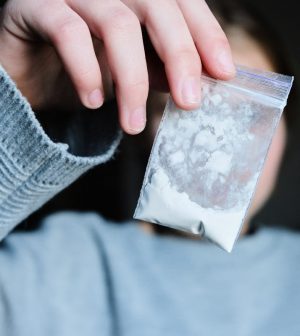- Could Your Grocery Store Meat Be Causing Recurring UTIs?
- Are You Making This Expensive Thermostat Error This Winter?
- Recognizing the Signs of Hypothyroidism
- 10 Strategies to Overcome Insomnia
- Could Artificial Sweeteners Be Aging the Brain Faster?
- Techniques for Soothing Your Nervous System
- Does the Water in Your House Smell Funny? Here’s Why
- Can a Daily Dose of Apple Cider Vinegar Actually Aid Weight Loss?
- 6 Health Beverages That Can Actually Spike Your Blood Sugar
- Treatment Options for Social Anxiety Disorder
Two-Drug Treatment Could Curb Meth Addiction

Though overdose deaths continue to surge, there is no approved medication to treat methamphetamine use disorder.
Now, an experimental two-drug therapy has yielded promising results, UCLA researchers report.
“These findings have important implications for pharmacological treatment for methamphetamine use disorder,” said researcher Dr. Michael Li, an assistant professor-in-residence of family medicine at the David Geffen School of Medicine at UCLA, adding that methamphetamine-involved overdoses have surged.
His team published its findings June 10 in the journal Addiction.
In urine tests for methamphetamine, drug-free results rose 27% among participants who received a combination of injectable naltrexone plus extended-release oral buproprion. Negative tests rose only 11%, meanwhile, in a control group.
Methamphetamine abuse is a growing problem around the world, with an estimated 34 million users in 2020 compared to 33 million 10 years earlier. In the United States alone, overdose deaths rose fivefold between 2012 and 2018.
The National Institute on Drug Abuse Clinical Trials Network has supported various trials, including this one, to evaluate different treatments for methamphetamine use disorder.
This trial, known as ADAPT-2, ran from May 2017 to July 2019 at eight sites. More than 400 participants were included, including 109 who received the experimental drug therapy in the first phase. That demonstrated that the combo worked at six weeks.
The new findings are from the trial’s second phase, which looked at a longer period. Partipants were drug-tested at weeks seven and 12 and again, after treatment, at 13 and 16 weeks.
While their results were encouraging, researchers said further study is needed to find out if the treatment lasts longer than 12 weeks and leads to further reductions in drug use.
“Prior stimulant use disorder treatment trials suggest that change in use is gradual [consistent with our findings], unlikely to result in sustained abstinence in a typical 12-week trial, and dependent on treatment duration,” the researchers said in a UCLA news release. “This warrants future clinical trials to quantify changes in [methamphetamine] use beyond 12 weeks and to identify the optimal duration of treatment with this medication.”
More information
The National Institute on Drug Abuse has more about methamphetamine use disorder.
SOURCE: UCLA, news release, June 10, 2024
Source: HealthDay
Copyright © 2026 HealthDay. All rights reserved.










